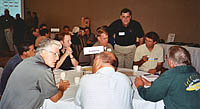
The discussion topics were changing faster than Dan Holohan could announce them to the crowd of 125-plus contractors, manufacturer reps, suppliers and engineers in the Morrison Room of the Sheraton Denver West. Wetstock III, held Saturday, Sept. 20, proved to be as informative - and entertaining - as Events I and II, to the surprise of … well, no one.
Holohan, hydronic heating “guru” and monthly columnist in SUPPLY HOUSE TIMES and its sister publications, Plumbing & Mechanical and PM Engineer, played Master of Ceremonies once again for the all-day program of roundtable discussions covering hot hydronics-related issues.
Groups gathered around tables with place cards announcing such topics as Boilers or Water Heaters, Marketing Hydronics, Steam Heat, Industry Associations, Zone Controls, Boiler Concerns and Snowmelting. Throughout the day, Holohan would overhear an interesting offshoot topic or collect suggestions from attendees, and then open up a new table under the heading, including such topics as Ethics and Work Vehicle Concerns.
Fresh design and installation techniques and new technologies were discussed, such as hydronics author John Siegenthaler's Hydronics Design Studio software program, demonstrated by Siegenthaler himself. Taco representatives made zone control wiring guides available. Another table was covered with “Widgets and Gadgets,” being explained by the man who brought them from all over Europe, Chris Rorke.
Here are some of the highlights from the discussions at the event:
-- Industry associations need to make the information more basic for the layperson, said one representative. “Industry is governed by unions that censor what information gets released. The media needs to contact companies to get their different opinions and provide all sides to the public.”
-- One group discussed a number of boiler concerns, including how to dispose of boiler condensate, what to do with the radiators collected from boiler replacement projects, the lack of longevity of new condensing boilers vs. cast-iron boilers, and how to get engineers to look at new methods of designing and to try new brands of boilers. Several suggestions were offered for each of these issues.
-- At the snowmelting table, a sticky problem was brought up by a contractor working on a condominium project. The association wanted to validate the cost of putting in a snowmelt system to the individual owners, and the contractor was looking for advice on how to quantify the advantages of snowmelt. His peers suggested that a comparison be drawn between the cost of snowmelt vs. the cost of plowing and shoveling, the chemicals needed to melt ice and snow, the destruction of the surface material and landscaping from all these, as well as the lack of space needed to store the plowed snow. Other suggestions included tracking the previous year's weather and forecasting how much the system would be used in the current year, putting meters on the snowmelt boilers for each of the individual units to measure the cost, and to run the snowmelt system in reverse to reuse the water in the ground loop system.
-- A large group gathered once the talk turned to ethics. For example, what should a small company do when pressured by a big wholesaler to not sell to smaller wholesalers?
Another problem discussed was the frustration among the various links of the distribution chain. “How does a new manufacturer go about the sale of its products? Some will sell directly to the contractor, but that puts the pressure on the manufacturer to provide salespeople with adequate technical knowledge to support their clients. Usually the wholesaler takes that on.”
One supplier responded, “Manufacturers should not be in the distribution chain because they don't know how to distribute.” Conversely, it was suggested that “the wholesalers could get quality engineers to handle the questions from contractors, but they don't want to pay them what they are worth.”
Another speaker commented that “a lot of times, sales are generated at the level of the engineer, so we don't even need the wholesaler,” and, “reps want to cut out the wholesaler, and vice versa.” Of the contractors present during the discussion, it's notable that only one was satisfied with his wholesaler.
The issue of the ethics of contractors buying products from other free trade countries and bypassing the wholesaler, or getting products from the Internet, was also raised. “You can go to a manufacturer's Web site and order a boiler, and it will be sent directly to you. You don't need the wholesaler,” one contractor said. Another speaker noted: “The industry cannot support the concept of the distribution chain as is, and since the distributor is the weak link, it will eventually go away.” Also, it was posited that “ASHRAE says A/E will be folded into the general contractor, since it all has to be worked out beforehand between all levels of the industry.”
In another discussion, it was said that a recent survey of homeowners regarding their heating systems yielded a high percentage that were unsatisfied. One attendee suggested that the industry as a whole needs to change the business model to address this, and that manufacturers need to look at what is important to the consumer rather than what is important only to their bottom line. It was also noted that a new market to target aggressively is the aging population: “They have money and they want comfort.”
